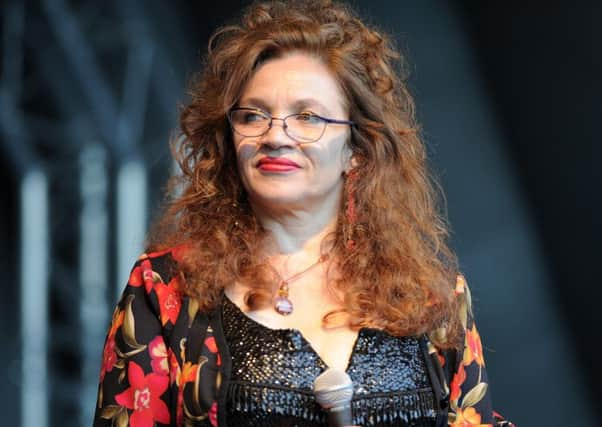Edinburgh Jazz Festival reviews: The Bad Plus | Soweto Kinch Trio | Jacqui Dankworth & Charlie Wood


The Bad Plus ***
Rose Theatre
Currently on their final tour in their longstanding configuration with pianist Ethan Iverson, the Bad Plus are a formidable trio, Iverson, with bassist Reid Anderson and drummer Dave King, establishing a reputation particularly through their off-the-wall interpretations of rock and pop numbers not generally associated with jazz repertoire.
Initially, however, their Rose Theatre gig suggested three fine musicians in search of a decent tune, their two introductory, self-composed numbers – Mint and the drolly titled Empire Strikes Backwards – involving masterly playing and continual snappy if ultimately frustrating tempo changes, while their first cover, Cyndi Lauper’s Time After Time, was metronomically deconstructed.
Advertisement
Hide AdAdvertisement
Hide AdThings warmed up melodically with You Are, Iverson’s sonorous piano chords ringing over busy drum and bass, while the ballad Neptune, the Planet opened with gently restrained piano and murmuring double bass before building up to a stately climax followed by a typically abrupt conclusion.
An Ornette Coleman number was given a properly robust treatment, Kraftwerk’s Robots was suitably mechanistic, loosening up at intervals, while King’s composition 1972 Bronze Medallist (it’s a long story), with its inexorably marching stomp, saw Iverson’s keyboard ranging inclining increasingly towards classical grandeur.
King erupted into a fierce drum break during the pianist’s frenetic County Seat while, in contrast, Anderson’s ballad Pound for Pound opened over drum taps, piano spelling out the melody, and was ushered along by the composer’s warm-toned bass, as Iverson built up to a triumphant climax before receding into silence.
JIM GILCHRIST
Soweto Kinch Trio ****
George Square Piccolo
A forceful and inventive alto saxophonist as well as streetwise rapper and radio jazz presenter, Soweto Kinch delivered a memorable set on this closing night of the Edinburgh Jazz Festival, featuring music from his current, mathematics-inspired album, Nonagram, in the company of two impressive young sidemen, double-bassist Nick Jurd and Slovakian drummer David Hodek.
Notes poured from Kinch’s saxophone like a seething, bebop-ish stream of consciousness which he combined with ingenious use of laptop samples, unleashing sometimes disconcertingly multiple horn voices, keyboard chimes, street sounds... even, as in the eventful Nostalgia, seagulls. Elsewhere the sax’s plangent voice briefly exuded melancholy before Jurd and Hodek led it into a bossa-like bounce.
Further judicious laptop prodding prompted further expansive choruses from that phantom horn section, but Kinch was far from being just nerdy hi-tech, engaging affably with an enthusiastic audience and, in his alter ego as MC, elicited lusty yells of “What is it for?” during his scathing, eponymous rap about current affairs paranoia.
Returning for an encore, Engine Drivers saw his sax sounding frantically once again over stuttering laptop, while Jurd and Hodeck remained utterly on the ball, the latter obliging with a well-chosen drum solo. Amid all this, it would probably be churlish to wish for a slightly higher melodic quotient in Kinch’s musical mathematics; as it is, he gives the impression of a forceful and ceaselessly questing musical intelligence.
JIM GILCHRIST
Jacqui Dankworth & Charlie Wood ****
Rose Theatre, Edinburgh
Advertisement
Hide AdAdvertisement
Hide Ad“Now you know why I married him,” smiled Jacqui Dankworth over one particularly mellifluous sung part by her husband Charlie Wood, who is Memphis-born, New Orleans-schooled and now a Professor at the Guildhall School of Music in London. The pair are a perfect complement to one another, each of their voices lifting the other’s to new heights.
Wood sat at the piano and brought subtle, unobtrusive backing for the vocal performances, with occasional permission to indulge himself – and us – in a solo. His voice was hard to tune out from, a wonderful and unlikely combination of softness of tone and a gravelly, masculine edge, calling to mind Tony Bennett at times. Dankworth, standing alongside, bore a vocal dynamism which must be at least partly genetic; she’s the daughter of jazz singer Cleo Laine and the late composer and saxophonist John Dankworth.
The duo had chosen a range of popular jazz standards and reinterpreted pop classics which suited their talents perfectly, from the New Orleans stomp of Duke Ellington’s I’m Beginning to See the Light to the gorgeous intertwined harmonies of Ella Fitzgerald’s Caravan, and the sweet warmth of James Taylor’s You’ve Got a Friend and the Beatles’ I Will. It’s easy to call the pair skilled pop interpreters, but Wood had it right after their glowing take on Simon & Garfunkel’s The 59th Street Song (Feelin’ Groovy): “These were all pop songs once, until they became ‘standards’.”
DAVID POLLOCK